The world of fitness and exercise has evolved significantly over the years offering individuals a variety of options when it comes to working out and achieving their fitness goals.
In this article, we will delve into the discussion on commercial gym vs private gym, assisting you in making an informed decision about which setting is best suited to your fitness journey.
These two types of fitness facilities each have their unique advantages and disadvantages, catering to different preferences and needs. Let’s discuss them now.

Commercial Gym
Commercial gyms are vast, bustling fitness establishments that are open to the general public. They often feature an extensive array of exercise equipment, group fitness classes, personal trainers, and other amenities designed to cater to a broad spectrum of individuals with diverse fitness goals.
These gyms can be found in most urban and suburban areas, making them easily accessible to a large population.
One of the primary advantages of commercial gyms is the sheer variety of equipment and resources available. Members have the opportunity to use state-of-the-art machines, take part in group workouts, and even access additional services like saunas or swimming pools, depending on the gym’s offerings.
The social aspect of commercial gyms is also appealing to many, as they provide opportunities to meet new people, find workout partners, and participate in group classes that can be motivating and fun.

Private Gym
Private gyms also known as boutique or personal training studios provide a more intimate and exclusive workout environment. These gyms are typically smaller in size and may require membership or appointment-based access. Private gyms are ideal for those seeking a more personalized fitness experience and individualized attention from trainers.
One of the major advantages of private gyms is the focus on customized workouts. Trainers can tailor exercise programs to your specific needs and goals, helping you achieve results more efficiently.
The smaller, more controlled environment also means less waiting for equipment, and a generally less intimidating atmosphere for those who may feel self-conscious in larger, busier gyms.
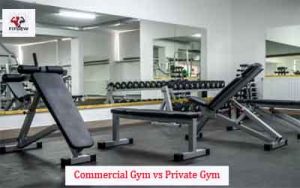
Choosing the Right Gym
When choosing between commercial and private gyms, consider the following steps
Define Your Goals: Clearly outline your fitness objectives. Are you looking to lose weight, gain muscle, improve endurance, or something else? Understanding your goals is the first step.
Budget: Assess your budget and determine how much you’re willing to invest in a gym membership. Commercial gyms are often more budget-friendly, but private gyms can provide excellent value for personalized attention.
Location: Consider the location of the gym. A gym that’s close to your home or workplace will make it easier to stay consistent with your workouts.
Trial Period: Many gyms offer trial periods or day passes. Take advantage of these to get a feel for the gym’s atmosphere, equipment, and services.
Ask Questions: Don’t hesitate to ask questions about the gym’s services, trainers, and equipment. This will help you make an informed decision.
Feedback and Reviews: Read reviews and gather feedback from current or former members to understand the gym’s reputation and the experiences of others.
For more details on what you need to check out before joining a gym check out our content about what to look for when joining a gym.
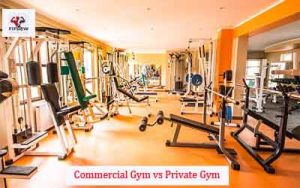
Commercial Gym vs Private Gym
Commercial gyms also known as fitness centers or health clubs are establishments that offer a range of exercise and fitness equipment, classes, and amenities for individuals to pursue their health and fitness goals.
These gyms are typically open to the public and require membership or payment for access.
Overview of Commercial Gym Chains and Their Benefits
Commercial gym chains have become increasingly popular over the years as more people prioritize their health and fitness. These chains offer a wide range of benefits, making it easier for individuals to achieve their fitness goals.
In this overview, we will explore some of the most prominent commercial gym chains and the advantages they provide to their members.
24-Hour Access: Many commercial gym chains offer 24-hour access, allowing members to work out at any time that suits their schedule. This flexibility is especially beneficial for individuals with busy lives, shift workers, or those who prefer to exercise during off-peak hours.
Variety of Equipment: Commercial gyms are typically well-equipped with a wide variety of exercise machines, free weights, and cardio equipment. This diversity allows members to target different muscle groups and engage in various workout styles, from strength training to cardiovascular exercises.
Group Fitness Classes: Gym chains often offer a range of group fitness classes, such as yoga, spinning, Zumba, and HIIT. These classes are led by certified instructors and provide a social and motivational aspect to working out.
Personal Training: Many commercial gym chains have certified personal trainers available to help members create personalized fitness plans, set goals, and receive one-on-one guidance. This is particularly advantageous for individuals who are new to fitness or have specific fitness goals in mind.
Hygiene and Maintenance: Gym chains prioritize hygiene and equipment maintenance, ensuring that the facilities are clean, well-maintained, and safe to use. Regular equipment servicing helps prevent injuries and provides a pleasant workout environment.
Community and Support: Joining a commercial gym chain can provide a sense of community and support. You will be surrounded by like-minded individuals with similar fitness goals, which can be motivating and inspiring. Some gyms even host social events and challenges to foster a sense of camaraderie.
Nutritional Guidance: Many gyms offer nutritional counseling and dietary advice. Some gym chains have partnerships with nutritionists or dietitians who can help members with meal planning and making healthier food choices.
Convenient Locations: Commercial gym chains often have multiple branches in various locations, making it convenient for members to find a gym near their home or workplace. This accessibility encourages consistent attendance.
Membership Perks: Some gym chains provide additional benefits to their members, such as discounts on workout apparel, supplements, and health services. These perks can make membership even more valuable.
Online Resources: In the digital age, many commercial gym chains offer online platforms and apps for tracking workouts, scheduling classes, and accessing workout plans. These tools can enhance the overall gym experience and help members stay on track with their fitness goals.
Affordability: While prices may vary, commercial gym chains often offer competitive pricing, making them accessible to a broad range of individuals. Many also provide various membership options, including short-term contracts and pay-as-you-go plans.
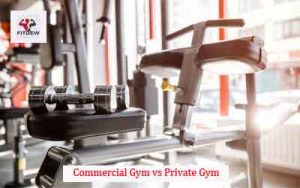
Overview of Private Gyms Chains and Their Benefits
Private gym chains have become increasingly popular in recent years, offering a range of benefits that appeal to fitness enthusiasts and those looking for a more personalized exercise experience. These chains typically differ from public gyms in several key ways
Exclusive Access: Private gym chains often require membership or subscription fees, granting members exclusive access to their facilities. This exclusivity can create a more comfortable and less crowded workout environment.
High-Quality Equipment: Private gym chains invest in state-of-the-art exercise equipment and facilities. This ensures that members have access to the latest technology and high-quality gear, which can enhance the effectiveness of their workouts.
Personalized Services: Many private gym chains offer personalized services, including one-on-one personal training, fitness assessments, and customized workout programs. These services help members reach their fitness goals more efficiently and safely.
Clean and Well-Maintained Facilities: Maintaining a clean and well-kept gym environment is a top priority for private gym chains. This attention to cleanliness and maintenance enhances the overall experience and can be especially appealing to those who are hygiene-conscious.
Variety of Classes: Private gym chains often provide a wide range of fitness classes, from yoga and spin to HIIT and strength training. Members can diversify their workouts and stay motivated by participating in these classes.
Flexible Hours: Private gym chains tend to offer more flexible operating hours compared to public gyms. This means members can work out at their convenience, accommodating various schedules.
Community and Networking: Private gyms often foster a sense of community and networking among members. This can be a valuable aspect for people looking to connect with like-minded individuals and find workout partners or even socialize.
Health and Wellness Services: Some private gym chains go beyond fitness and offer additional health and wellness services, such as nutritional counseling, massage therapy, and physical therapy. These services can contribute to a well-rounded approach to health.
Enhanced Privacy: Private gym chains provide a level of privacy that public gyms cannot match. Members can work out without feeling self-conscious or scrutinized by others.
Specialized Amenities: Many private gym chains include specialized amenities such as saunas, swimming pools, hot tubs, and childcare services. These extras can make the gym experience more enjoyable and convenient.
Member-Exclusive Events and Discounts: Private gym chains often host member-exclusive events and provide discounts on fitness products and services, creating additional value for their members.
Motivational Atmosphere: The atmosphere in private gym chains is typically motivating and focused on personal improvement. This can help members stay committed to their fitness goals.
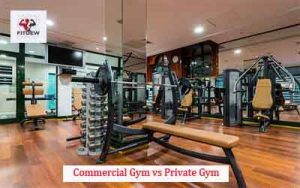
Convenience and Accessibility of Commercial and Private Gyms
Gyms have become an integral part of modern society, catering to individuals seeking better physical health, improved fitness, and a more active lifestyle.
When it comes to convenience and accessibility, both commercial and private gyms offer unique advantages, and the choice between the two often depends on personal preferences and needs.
Commercial Gyms
Variety and Amenities: Commercial gyms typically offer a wide range of exercise equipment, classes, and amenities. These include cardio machines, free weights, group fitness classes, saunas, and more. This variety can cater to different workout preferences and help individuals stay engaged.
Location and Accessibility: Commercial gyms are often conveniently located in urban areas and suburbs, making it easy for people to access them. The multiple branches of larger chains can be particularly beneficial, ensuring that you can find a gym near your home or workplace.
Flexible Hours: Most commercial gyms have extended hours, allowing members to work out at various times during the day. This flexibility is great for individuals with busy schedules.
Social Environment: Commercial gyms are often bustling with people, creating a social atmosphere. This can be motivating for some individuals, as it provides a sense of community and the opportunity to meet like-minded fitness enthusiasts.
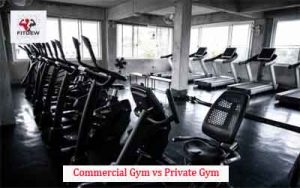
Private Gyms
Personalized Experience: Private gyms, including home gyms, offer a highly personalized experience. You can set up the gym to suit your specific needs and preferences. This can be especially appealing to those who want to work out in a space they have complete control over.
Privacy: Private gyms provide privacy and eliminate the potential discomfort some people feel when working out in front of others. This can be especially valuable for those who are self-conscious about their appearance or fitness level.
No Membership Fees: While setting up a private gym may have an upfront cost, there are no ongoing membership fees. Over time, this can be more cost-effective for individuals who are committed to regular exercise.
Convenience: Home gyms, in particular, offer unmatched convenience. There’s no need to commute, wait for equipment, or abide by the gym’s schedule. You can work out whenever you want, making it easier to integrate fitness into your daily routine.
Conclusion on Commercial Gym vs Private Gym
Commercial gyms are typically more accessible and affordable, making them suitable for a wide range of people. They provide a variety of equipment, and group fitness classes, and often have extended operating hours, accommodating different schedules.
The social atmosphere of a commercial gym can be motivating for those who thrive on interaction and competition.
Private gyms offer a more personalized and intimate workout experience. They are ideal for individuals who value privacy and exclusivity. Private gyms often have more focused training programs and a quieter environment, which can be conducive to intense concentration and individualized attention from trainers.
Your decision of the one to go for depends on what you prioritize in your fitness journey. If cost and convenience are significant factors for you, a commercial gym may be the better choice.
If you seek a tailored and exclusive experience with more personalized guidance, a private gym might be the way to go. In some cases, a combination of both can also be an effective approach, allowing you to enjoy the benefits of each.
The most important thing is to choose a fitness environment that supports your fitness goals, encourages consistency, and keeps you motivated to lead a healthier lifestyle.
Whether commercial or private, both gym options have their merits, and the choice should align with your specific needs and preferences.
We would love to hear about your experiences and preferences when it comes to commercial gyms vs. private gyms.
Whether you’re a die-hard gym-goer, a casual exerciser, or someone who’s just starting out on their fitness journey, your insights can be valuable to others making a decision about where to work out.
Check out here for information on how to maximize your gym time.
Frequently Asked Questions on Commercial Gyms Vs Private Gyms
What is the main difference between a commercial gym and a private gym?
Commercial gyms: These are large, membership-based fitness centers that offer a wide range of equipment, classes, and amenities.
Private gyms: These are smaller, often membership-based gyms that focus on personalized training, specialized classes, and a more private, exclusive environment.
Which one is more cost-effective, a commercial gym or a private gym?
Commercial gyms: Generally, commercial gyms offer lower membership fees due to their large membership base and scale.
Private gyms: Private gyms tend to be more expensive due to their specialized services and personalized training.
Are there more equipment options in commercial gyms compared to private gyms?
Yes, commercial gyms usually have a wider variety of exercise equipment due to their larger space and budget.
Which option is better for beginners: commercial or private gyms?
Commercial gyms are often more beginner-friendly due to their spacious layout, diverse equipment, and introductory classes.
Is there a difference in the cleanliness and maintenance of equipment between commercial and private gyms?
Commercial gyms: Maintenance standards can vary, but commercial gyms usually have staff dedicated to cleaning and maintaining equipment due to their high traffic.
Private gyms: These gyms often have higher cleanliness standards due to their smaller scale and exclusive clientele.
Editor’s Picks
Aerobic and Anaerobic Exercise Examples
7 Early Morning Exercise Benefits
